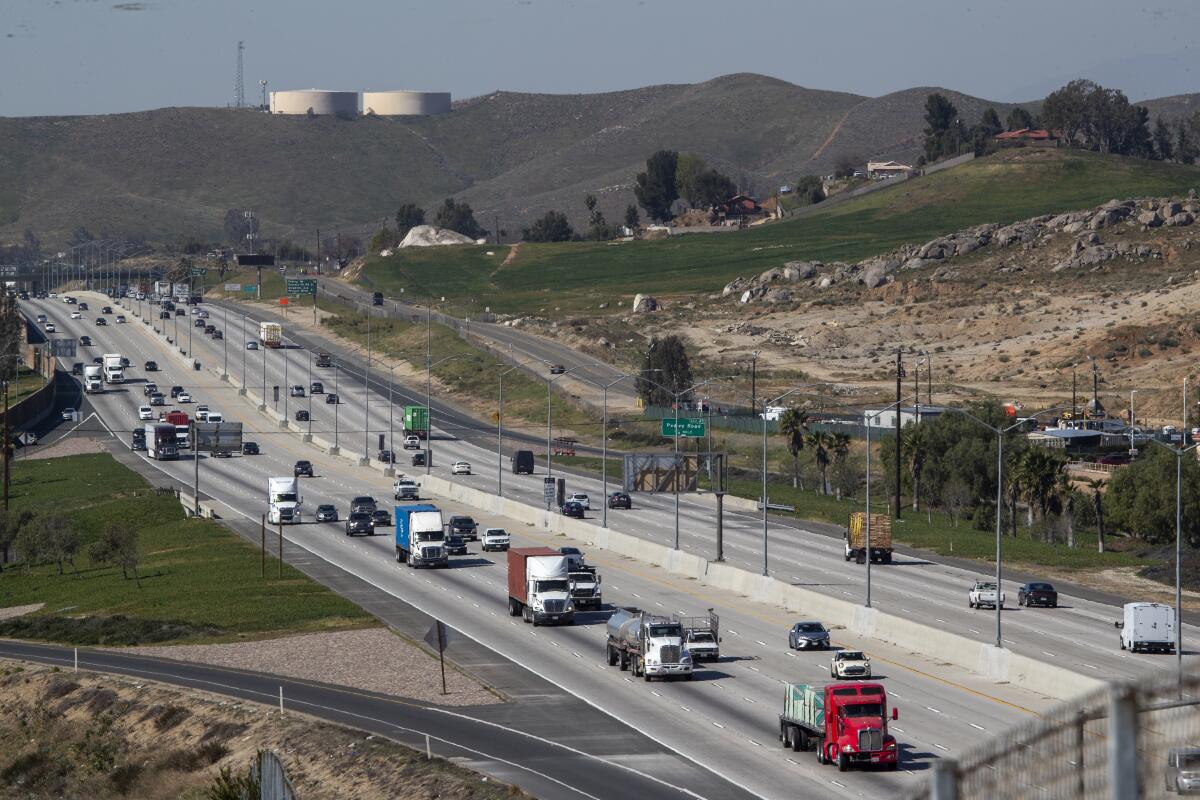Why aren’t dirty diesel trucks in California smog-checked? That could soon change

- Share via
For decades California has required owners of older cars to pass periodic tailpipe emissions tests in order to register their vehicles. But there is no smog check program for the more than 1 million heavy-duty diesel trucks operating in the state, even though they spew far more health-damaging air pollution.
But state regulators are finally moving to fix that. The Air Resources Board is set to vote next week on rules that will create a truck smog check program and require diesel-fueled big rigs to pass semiannual tests in order to drive on California roads.
It can’t happen soon enough. Virtually all heavy-duty trucks in California are diesel-fueled, and their lung-damaging exhaust causes health and air quality impacts far out of proportion with their numbers. Trucks and other heavy-duty vehicles make up about 3% of the vehicles on California roads, but they spew more than half of its on-road smog-forming pollution.
Diesel exhaust is one of the state’s biggest environmental health hazards, driving up asthma rates and cancer risk and shortening people’s lives in communities near ports, warehouses, freeways and other transportation corridors. Pollution-choked neighborhoods are in desperate need of air quality improvements at a time when the booming goods movement industry is clogging roadways with trucks and smog levels have been getting worse.
Much like with cars, the truck smog check program is not designed to ensnare the vast majority of truckers whose vehicles are in compliance and in good working order, but would instead target gross polluters that are most responsible for fouling the air. Regulators say most of the state’s truck pollution is coming from about 10% of vehicles that have something wrong with their emissions controls. It’s important to level the playing field and make sure our state no longer offers safe harbor to truck owners who have obtained an unfair advantage by failing to maintain their rigs or invest in required pollution controls.
The benefits of going after a relatively small number of polluters are enormous. Putting in place a smog check, as required under legislation by state Sen. Connie Leyva (D-Chino) that Gov. Gavin Newsom signed into law in 2019, would reduce more pollution than any state emissions rule since 2008 and bring enormous health benefits in the coming decades, including the prevention of more than 7,000 early deaths and thousands of emergency room visits. The greatest impacts would be in Southern California and the San Joaquin Valley, where millions of residents suffer from smog and soot levels that routinely violate federal health standards.
Compliance would be easier than for passenger vehicles. Under the state’s proposal, most truck owners would not have to visit any testing location. Instead, they could meet the requirements by submitting emissions data remotely from their on-board diagnostics twice a year using automated systems or plug-in devices — though some older trucks would require in-person tests.
Smog checks for trucks are such a no-brainer that in 2019 Newsom and other lawmakers were surprised to learn they weren’t already required, according to environmental advocates who for years pushed the state to put them in place.
So why has it taken so long?
Blame politics, lagging technology or perhaps timid regulators. Diesel trucks have trailed far behind passenger vehicles in their pollution controls. Catalytic converters, for example, didn’t come standard in trucks until 2010. And officials have been wary of going too hard on the economically vital trucking industry, which has pushed back mightily in response to past air quality rules.
The Air Resources Board had received only nine written comments on the rule by Monday’s deadline, and it’s telling that business groups weren’t asking regulators to scrap smog-testing requirements entirely, but mostly requesting small changes to ease compliance. It suggests this is a commonsense program that should have been in place years ago.
To clean smog and slow climate change, California ultimately needs to eliminate truck emissions entirely. The Air Resources Board made an important step in that direction last year, adopting a first-of-its-kind rule requiring that all trucks sold in the state be zero-emission by 2045. But in the meantime, regulators must do everything they can to ensure the trucks that are on the road today are as clean as they were designed to be.
More to Read
A cure for the common opinion
Get thought-provoking perspectives with our weekly newsletter.
You may occasionally receive promotional content from the Los Angeles Times.









